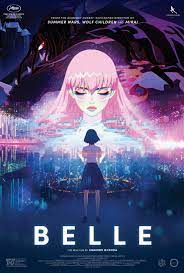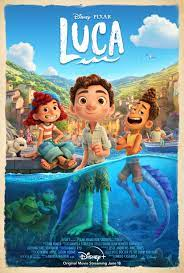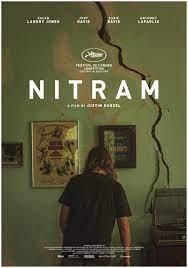Once again, I dedicate this list and post to all the filmmakers and studios who managed to produce and release their films amidst a worldwide pandemic.
10-1:
Starting off with one I was quite torn about, as I'm a staunch anti-monarchist but had loved Chilean director Pablo Larrain's previous efforts No (2012) and Jackie (2016), this intentionally anachronistic psychological drama reimagines Princess Diana's private life in 1991 as her marriage to Charles was on the rocks and the rest of the Windsors looked down upon her. Larrain and screenwriter Steven Knight apply a very self-conscious approach to this narrative, but that quickly proves very wise and empathetic because it's their way of conveying to the viewer how Diana herself felt that way, or at least does in their version of events. That insightful reflection also rubbed off on Kristen Stewart, who absolutely transforms into the lead role; she's breathtaking. Everything else about Spencer also holds its own alongside her.
Japanese anime maestro Mamoru Hosoda's 2018 masterwork Mirai was drawn (pun intended) from his family life, and last year he turned his focus to more global concerns, woven through a science fantasy narrative, with Belle. Strongly invoking, as the title suggests, the classic fairy tale Beauty and the Beast and its 1991 Disney adaptation, this follows 17-year-old Suzu Naito (voiced in the Japanese version by Kaho Nakamura), who's mostly an outcast at school and fighting with her family at home. So at a friend's suggestion, Suzu logs into the vast and vastly popular online world called "U," where she adopts a beautiful avatar and the new name "Belle," the Japanese form of her real name. Suzu quickly, of course, spends more of her time online as Belle until her online and offline lives begin to overlap, and not quite for the better. This was a step in Disney's direction for Hosoda and that shake-up initially frustrated and confused me, but as it progresses the point of the extended Beauty and the Beast reference became increasingly obvious and its application powerful and wise. Also, the visuals and score are superb as well. While I think it falls short of Mirai, with Belle Hosoda has made a striking anime concoction that unexpectedly, and brilliantly, blends a familiar fairy tale narrative with a cautionary tale about technological addiction and cyberbullying.
The 18th-century English artist Louis Wain was known for having an outrageous style that sprung from an eccentric mind, and the dramedy biopic The Electrical Life of Louis Wain recreates his tale in a manner of which I think he'd have approved. It seriously feels like a marriage of Jane Campion's and Terry Gilliam's filmmaking and storytelling styles and a shockingly successful one at that. But instead, it's from director Will Sharpe (also the lead actor on the massively underrated UK sitcom Defending the Guilty) and his co-writer Simon Stephenson, both of whom inject the film with considerable compassion for Wain (an effective, if slightly typecast Benedict Cumberbatch) alongside the very garish and postmodern aesthetics. Most importantly, though, it's lucid and coherent throughout. The Electrical Life of Louis Wain has serious voltage.
Italian-born Pixar animator Enrico Casarosa makes his directorial debut with Luca. It's 1959 in the town of Portorosso on the Italian Riviera, and under the sea lives timid adolescent sea monster Luca Pacuro (voiced by Jacob Tremblay) with his parents Daniela and Lorenzo (Maya Rudolph and Jim Gaffigan), who forbid him from visiting the surface for fear he'll be eaten there. One day he meets Alberto Scorfano (Jack Dylan Grazer), another child sea monster who lives above the surface alone. They quickly become best mates and Alberto soon encourages Luca to join him on an adventure in Portorosso. So now off they both go to experience the Riviera but meanwhile, of course, Daniela and Lorenzo notice Luca's missing and they embark on their own journey to bring him back home. Now, the emotional punches didn't quite hit me, and the parental subplot was one I recognised instantly from a lot of other family films. But make no mistake, this one still charmed my socks right off and made me smile widely. That's because it's culturally authentic and sensible from beginning to end, and I think Pixar's funniest movie since Ratatouille. Casarosa evidently wanted to make an animated film about his native culture to spread the love, and here he did so with just the right consistency. It's sweeter and tastier than a gelato.
Adam Driver and Marion Cotillard are Henry and Ann, respectively a failing stand-up comedian and a famous opera soprano, who meet and quickly marry. They're genuinely in love initially and they have a daughter, Annette, but things gradually turn sour between them until tragedy befalls one of them. I'll say nothing more about this one's plot for spoiler reasons. This effort from French director Leos Carax and writers Ron and Russell Mael is very weird and cryptic, and one very short scene was almost too outlandish IMO, but still I found it stunning. That was because there was just something trustworthy about it assuring me if I continued following this cinematic breadcrumb trail I'd eventually work it all out (and I did). It's a very energetic and stylish rock musical with engaging songs and surprisingly strong vocals all around, and a profound, unexpected and restrained meditation on the exploitation and manipulation of children.
Before he revolutionised musical theatre worldwide with Hamilton, Lin-Manuel Miranda wrote the 2007 Broadway hit In the Heights, which director Jon M. Chu and screenwriter Quiara Alegria Hudes, who also co-wrote the show, translated superbly to the screen last year. Now in most cases I truly loathe musicals and so, having two in this list almost seems too good to be true. But it is true; this one goes for almost two and a half hours and yet it had me completely absorbed and entertained throughout. Our hero is Usnavi de la Vega (Anthony Ramos), who recounts a story from his life ten years before when he ran a convenience store in the Washington Heights neighbourhood of New York City, which has a huge Dominican population. From behind its counter Usnavi longed for an escape to a better and more prosperous life and all his friends and colleagues did likewise; they included Benny (Corey Hawkins), Nina (Leslie Grace), Sonny (Gregory Diaz IV), Daniela (Daphne Rubin-Vega), Abuela (Olga Merediz), the older woman who mentors her young neighbours, and most notably Usnavi's dream girl Vanessa (Melissa Barrera). Before Usnavi can turn a new leaf over, however, he first has to help all of them to achieve that themselves. In the Heights is a musical exploding with life and confidence, not to mention choreography that always feels somehow planned yet natural and not obvious, and the songs are a refreshing and unpredictable mix of hip hop, salsa and pop (I hate regular show tunes, hence why I hate most musicals). Plus, its narrative is very lucidly plotted and a fairly unconventional coming-of-age one as it's told in flashback, the cast all show a real enthusiasm for this narrative and its themes and focus, and its editing and cinematography are both energetic but never too flashy. I also even found it quite relatable, as Abuela reminded me quite strongly of a teacher aide at my high school who was really like a mother to us students. In the Heights easily reaches great heights.
Thomasin McKenzie is Ellie Turner, a young arrival in London who is obsessed with the fashion and music of the Swinging Sixties and dreams of becoming a designer like her late mother. She's enrolled in the London College of Fashion but struggles to make friends there and so she decides to assume residence as a bedsitter with the elderly Ms. Collins (Diana Rigg in her last role; the film is dedicated to her). On Ellie's first night in her new lodgings, she has a vivid dream that transports her back to '60s London and in it she visits the Cafe de Paris nightclub where she encounters a confident young woman named Sandie (Anya Taylor-Joy), who's there to enquire about a singing gig. After she wakes in the morning from this most memorable dream, Ellie resumes her real life in the present, but her dreams involving Sandie and '60s London continue until the lines between her dreams and her reality become very blurred and some disturbing connections between the two girls and Ms. Collins emerge. This latest effort from English director and co-writer Edgar Wright, collaborating now with co-writer Krysty Wilson-Cairns, is arguably his best movie yet. Last Night in Soho is niche, deliberately erratic and very cryptic, but it's also riveting, hypnotic, sensuous, scary and altogether stunning. Wright and Wilson-Cairns have together fashioned a narrative that melds romance, period drama and, most prominently, psychological horror into a consistently stimulating puzzle, and Wright tells it with both delicate restraint and ferocious gusto where each one is appropriate while simultaneously visualising it with striking contemporary and period design. He also coaxes affecting turns from McKenzie and Taylor-Joy and a well-layered one from Rigg as the quite duplicitous Ms. Collins, and cinematographer Chung-hoon Chung and editor Paul Machliss bring yet more style and suspense to it. Steven Price's heart-pounding score ices the cake. Last Night in Soho is one intense yet memorable cinematic dream.
In this origin story of Dodi Smith's iconic dalmatian-hunting villainess from Disney and Aussie director Craig Gillespie, the ever-fabulous Emma Stone is Estella Miller, an aspiring fashion designer making her professional start in 1970s London during the punk rock explosion. Her two best friends since childhood are Jasper (Joel Fry) and Horace (Paul Walter Glaser, who previously starred in Gillespie's I, Tonya), a pair of street pick-pockets and fellow outcasts who take her journey with her. Things begin to look up for Estella when she secures a job with the Baroness (Emma Thompson), the icy and snobbish head of a haute couture fashion house but of course, the ruthless ambitious Estella soon wants it to be her way or the highway, an attitude that sours her working relationship with the Baroness until some unexpected revelations about the older woman surface. Cruella is a relentlessly over-the-top and crazy ride, it really is, but not only is that exactly the point, that's why it's such enormous fun. But nonetheless, there's a gradual yet genuine and unmistakable depth to it that will sneak up on you. Gillespie, who previously made the outstanding Lars and the Real Girl and (as I said) I, Tonya, took to this material like somebody dying of starvation to a hot meal and his fervour and enthusiasm for it are obvious in every scene. Working from Dana Fox and Tony McNamara's well-layered screenplay (Aline Brosh McKenna, Kelly Marcel and Steve Zissis developed the story), Gillespie infuses the movie with a wickedly assertive and vibrant punk aesthetic (the soundtrack matches this, featuring such acts as Blondie, the Clash, Queen and the Doors) but also a more Gothic tone towards the end that fits the emotional climactic twist. And while all the cast are engaging throughout, Stone plays a villain like she's wanted to for years. Cruella is like Terms of Endearment meets a Vivienne Westwood fashion parade: it's sometimes anarchic, sometimes Dickensian, sometimes funny, sometimes moving, and at all times wonderful.
Now, I know I may lose a few people with this choice. And I fully understand why it was so controversial in Australia and particularly in Tasmania. But I still implore everybody to at least try watching it before judging it. Caleb Landry Jones is Nitram (based on Martin Bryant), a troubled and mentally handicapped young man living in rural Tasmania with his unnamed parents (Judy Davis and Anthony LaPaglia). He drifts from job to job, unable to hold one down due to his behaviour stemming from his disturbed psyche, but soon meets and befriends local widowed heiress Helen (Essie Davis). This blossoming friendship and professional relationship ends, however, when he accidentally causes her to have a car crash in which she dies and he is severely injured. From there, something finally snaps inside Nitram with truly devastating consequences. This effort from director Justin Kurzel and writer Shaun Grant, who previously made the equally successful and very horrifying Snowtown, is unquestionably a tremendously brave film and not only in how it explores the events leading up to the most infamous massacre in Australian history. It also attempts, in great detail, to evaluate Bryant's psychotic mentality and how that frankly played a considerable role in his path to Port Arthur in 1996 (although make no mistake, that's no excuse for murdering 35 people). But, admirably, Kurzel and Grant never once judge or defend him or any of his actions; their approach here is thoroughly objective, detached and empathetic to all four central characters. Kurzel employs a very cold and austere visual language that hauntingly evokes Nitram's very insular and exclusive mindset while also reflecting the struggles his parents and Helen experience in dealing with him and their own emotions. Germain McMicking films all of this so delicately and Nick Fenton's editing and Jed Kurzel's music are both very tactfully restrained. The two Davises (Essie is actually Kurzel's wife) and LaPaglia all give powerful and balanced turns but really, the movie belongs to Caleb Landry Jones. In what may be the best performance of 2021, he disappears into an exceptionally difficult role; for starters he's American and neurotypical playing an Australian, autistic character (Bryant was diagnosed in prison with Asperger's syndrome). His accent, which he honed from binge-watching Australian TV shows including Hey Hey It's Saturday and Neighbours, never slips once and he depicts the social awkwardness and ineptitude so naturally it's almost skin-crawling. Regardless of who it's based on, Nitram swept the 2021 AACTA Awards and deservedly so. It certainly isn't a film everybody in Australia will be comfortable watching (and for the record it was filmed in Victoria instead of Tasmania for obvious reasons), but it's not meant to be comfortable viewing. It is meant to be confrontational and challenging, and it succeeds at both. But it's also mesmerising, powerful, empathetic (as I said) and greatly haunting.
But alas, that leaves just one, my annual winner. And for 2021, this is it. In 1968, Fred Hampton (Daniel Kaluuya) was chairman of the Illinois chapter of the Black Panther Party, and at age 20 his influence was already such that he had a target on his back nationally. William O'Neal (LaKeith Stanfield) was a petty thief until he encountered FBI Agent Roy Mitchell (Jesse Plemons), who offered him a deal: if he infiltrated the Illinois BPP chapter for information on Hampton's whereabouts, he would be spared prison time for his crimes. He accepted that deal, and after infiltrating the Illinois chapter and befriending Hampton, O'Neill betrayed him, which resulted directly in Hampton's assassination the next year. Chairman Fred was just 21, and left his pregnant fiancee Deborah Johnson (Dominique Fishback) behind; their son Fred Jr. was born 25 days after Fred was killed. I was absolutely speechless and stunned after I first saw Judas and the Black Messiah in June, and after both subsequent viewings of it I still was. I said it then and I stand by it: this one will shake you up like a fucking earthquake. I also said, on Facebook, that if it wasn't my #1 of 2021 I'd eat my hat; well, I guess my hats (and my digestive system) have been spared. Director Shaka King truly outdid himself here; his pacing, his visual choices, his emotional approach to it, everything about his direction is just perfectly judged and his desire to spread the movie's social and political messages (which sadly are as necessary now as in Hampton's time) is obvious and certainly justified. He co-wrote the screenplay with Will Berson, after they developed the story with Kenny and Keith Lucas, and all four were deservedly nominated for the Best Original Screenplay Oscar (the movie was released in February, making it eligible for last year's Oscars after the Academy extended the eligibility period this time due to the COVID-19 pandemic); the script is very well-researched and evokes the era thoroughly in the dialogue, also staying as true as possible to the historical events. Kaluuya won the Best Supporting Actor Oscar and he's dynamite, particularly in the rally scenes when he channels Hampton's fieriness, but Stanfield, who was also nominated for it, is arguably even better. As O'Neal he delivers a stunningly layered and cunning turn in a more challenging and far less showy role and how Fishback wasn't even nominated at Oscar time is beyond me; her performance is admirably powerful and controlled, especially in her last scene. (It's worth noting at this point that the real Deborah Johnson - now known as Akua Njeri - and Fred Jr. served as consults to the production, and Njeri was on set when the assassination scene was filmed, telling Fishback not to cry as she didn't cry when it happened and as a show of strength for women of colour). The surrounding cast also all hold their own, including Plemons, Martin Sheen (as J. Edgar Hoover) and Dominique Thorne (as young BPP recruit Judy Harmon). Sean Bobbitt's Oscar-nominated photography suitably reflects the mood of the period, Kristian Sprague's editing seamlessly weaves the dramatised scenes and the archival footage together for maximum effect and the soundtrack, comprising Mark Isham's beautifully delicate score and H.E.R.'s rousing Oscar-winning song "Fight for You," completes the knockout. Judas and the Black Messiah is an absolute masterpiece, and I firmly believe an instant classic. Wow.










No comments:
Post a Comment